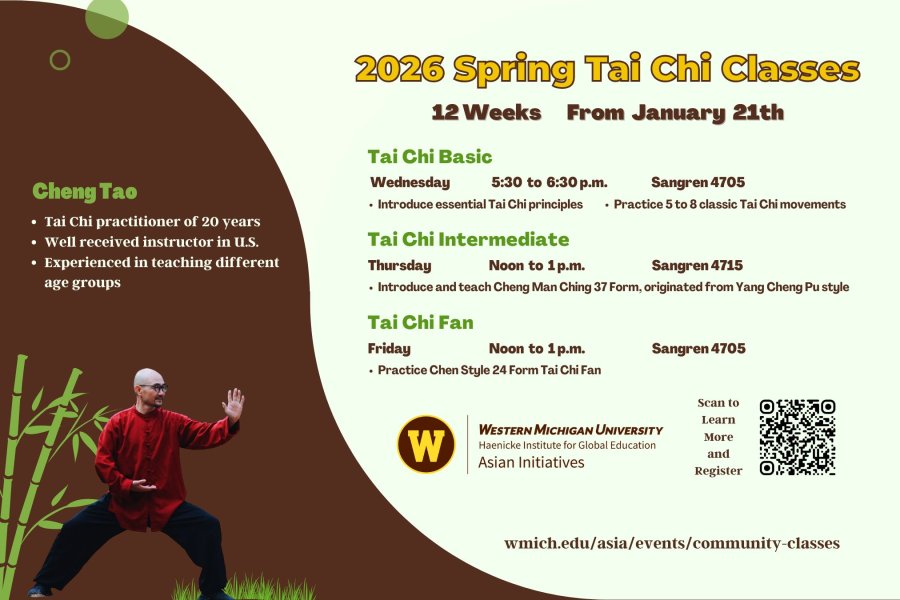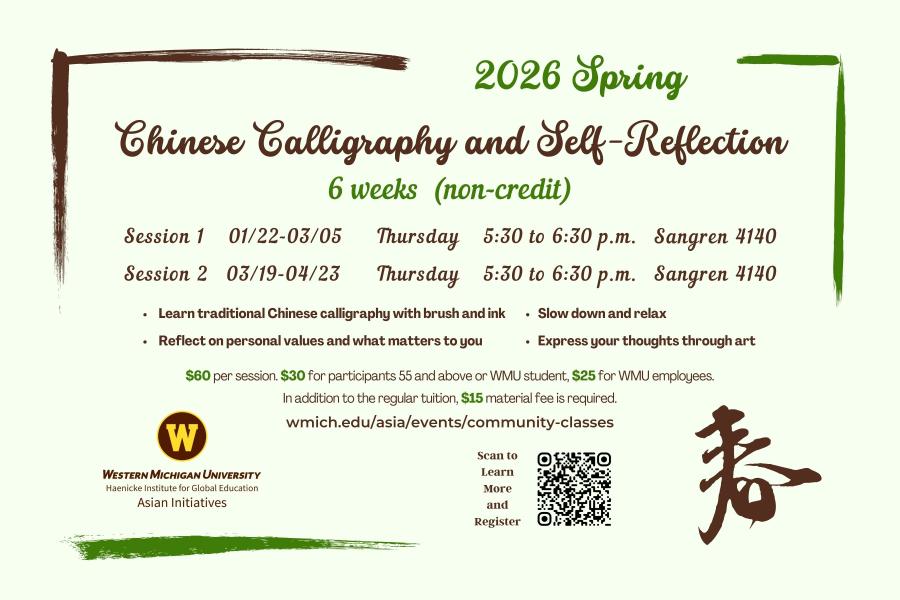2026 Spring Community Class Registration: Tai Chi and Chinese Calligraphy
Asian Initiatives offers non-credit classes to WMU faculty, staff, students and the community.
2026 Spring:
- Tai Chi
- Chinese Calligraphy and Self Reflection


2026 Spring Classes
TAI CHI
| Class | Day | Starting Date | Sessions | Time | Location |
|---|---|---|---|---|---|
| Tai Chi Basic | Wed | January 21 | 12 weeks | 5:30 p.m. to 6:30 p.m. | Sangren 4705, WMU |
| Tai Chi Intermediate | Thu | January 22 | 12 weeks | Noon to 1 p.m. | Sangren 4140, WMU |
| Tai Chi Fan1 | Fri | January 23 | 12 weeks | Noon to 1 p.m. | Sangren 4705, WMU |
CHINESE CALLIGRAPHY AND SELF-REFLECTION
| Class | Day | Starting Date | Sessions | Time | Location |
|---|---|---|---|---|---|
| Chinese Calligraphy and Self Reflection2 | Thu | January 22/March 193 | two 6-week sessions | 5:30 p.m. to 6:30 p.m. | Sangren 4140, WMU |
1 In addition to the regular tuition, $5 material fee is required for the Tai Chi Fan class. Fan will be provided, but needs to be returned upon the completion of the session.
2 In addition to the regular tuition, $15 material fee is required for the Chinese Calligraphy and Self Reflection class.
3 Session 1: 1/22-3/5. Session 2: 3/19-4/23.
Cost and Payment
Cost
Fall and Spring Classes
Each course costs $120. In addition to regular tuition, some courses may require a material fee.
Summer Classes
Each course/session costs $60. In addition to regular tuition, some courses may require a material fee.
Discounts
- 50% tuition discount to WMU students and community senior citizens (55 and above)
- $25/course for WMU employees
- For courses requesting a "Material fee" apart from the tuition cost, all participants must pay this fee in full.
For example, if you are a WMU employee, and you want to take the Chinese Painting class that has a material fee of $30, the total amount you need to pay is $25 + $30 (material fee) = $55. If you are a WMU student or community senior citizen, and you want to take the Chinese Painting class, the total amount you need to pay is $60 (50% discount ) + $30 (Material fee) = $90.
Payment
The cost for each class (including any applicable materials fees) must be paid in full on or before the first day of class.
Payment Method
Pay Online:WMU Online Pay: https://wmuhige.securepayments.cardpointe.com/pay?On the “Invoice Number” line, please write "AICC". You will receive a confirmation Email with a transaction ID, please fill in this number on the registration form.NOTE: No WMU staff can enter payment information into this site using a WMU computer. This violates PCI requirements and will raise a red flag in the system, as we are connected to the WMU network.Pay by Check:Make check payable to WMU and mail to the address below. Please fill in the check number on the registration form.Asian InitiativesEllsworth 2425EHaenicke Institute for Global Education1903 W Michigan Ave, Kalamazoo MI 49008-5245
Taichi
Why Do We Practice Tai Chi?
Tai Chi is a traditional Chinese martial art originally designed as a unique self-defense technique, which later evolved into an effective health exercise. Characterized by flowing, graceful, and well-balanced movements, Tai Chi strengthens both the body and mind, promoting complete harmony between the two. Through practicing Tai Chi, practitioners integrate the balance of Yin and Yang, the essence of nature, and the art of relaxation into their lives. Suitable for people of all ages, genders, and health conditions, Tai Chi is an ideal form of physical exercise for many.
Tai Chi classes are open to WMU faculty, staff, students and the community (18 and above).
Tai Chi Class Levels
| Level | Prerequisite | Description |
|---|---|---|
| Tai Chi Basic | 18 and above, able to stand and follow the movements for 1 hour. | This course will introduce some essential Tai Chi principles such as controlled relaxation, mental quietness, breathing in depth, intent first etc. The class will practice 8 Trigrams and 5 steps. By the end of the session, students are expected to grasp these essentials and be able to practice basic Tai Chi movements independently. |
| Tai Chi Intermediate | Has taken Tai Chi basic, and received the instructor's reference prior to registering for this class. | This class will introduce and teach Cheng Man Ching 37 Form (CMC 37). CMC 37 was developed by Professor Cheng Man Ching. Regarded as the “Master of Five Excellences”, Cheng excelled in Poetry, calligraphy, painting, medicine, and Tai Chi. Originated from Yang Cheng Pu style, CMC 37 incorporated Cheng’s personal understanding derived from years of practice. |
| Tai Chi Fan | Has taken Tai Chi basic, or has learned basic Tai Chi within 2 years prior to this class. | The class will be engaging in the practice of the Chen Style 24 Form Tai Chi Fan. Tai Chi Fan presents a captivating dimension of Tai Chi that seamlessly blends martial arts techniques with the elegant motions of the fan. It offers an unique way to simultaneously train the body and nurture the mind. |
Chinese Calligraphy and Self-Reflection
Chinese Calligraphy and Self-Reflection introduces the art and philosophy of traditional Chinese calligraphy to students through a hands-on approach. The goal is not only to teach brush techniques, but also to help participants find inner peace through the process of slowing down, reflecting on personal values, and expressing themselves in a meaningful way.

